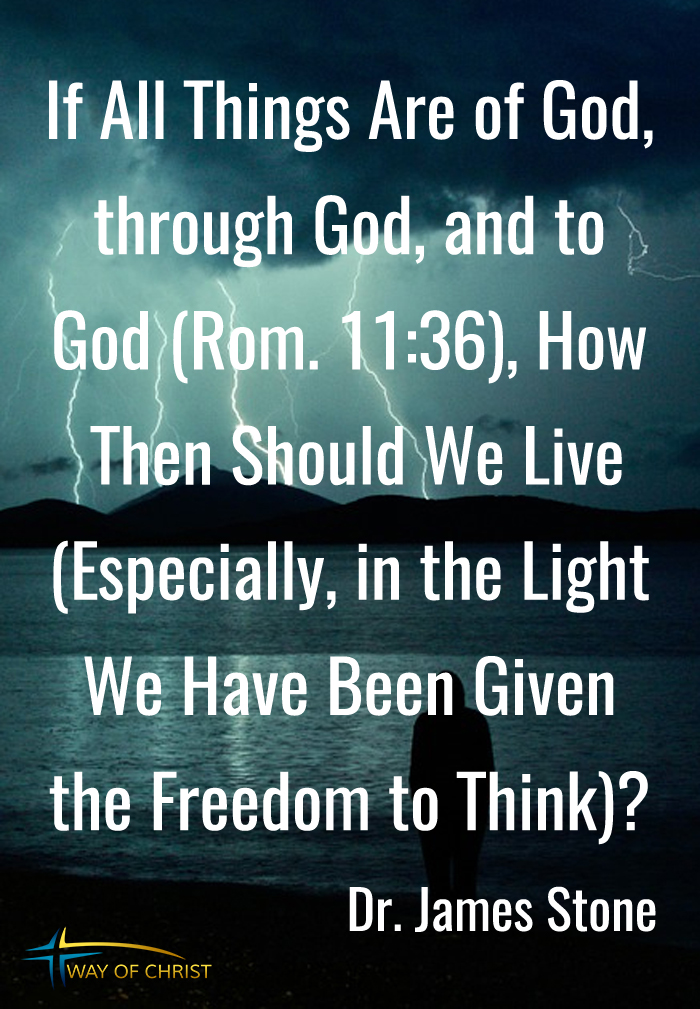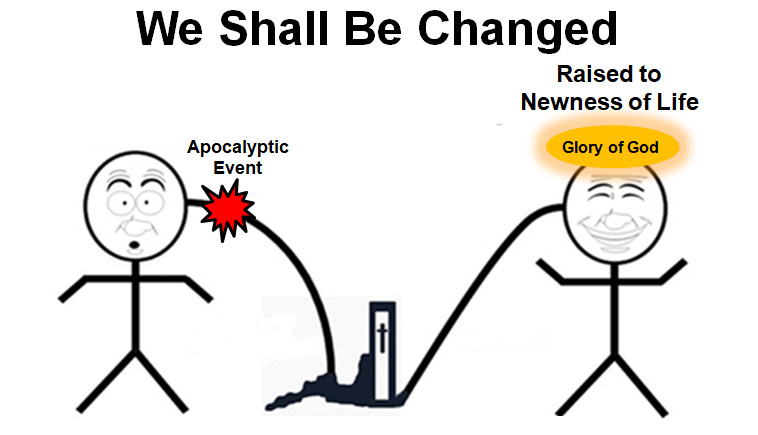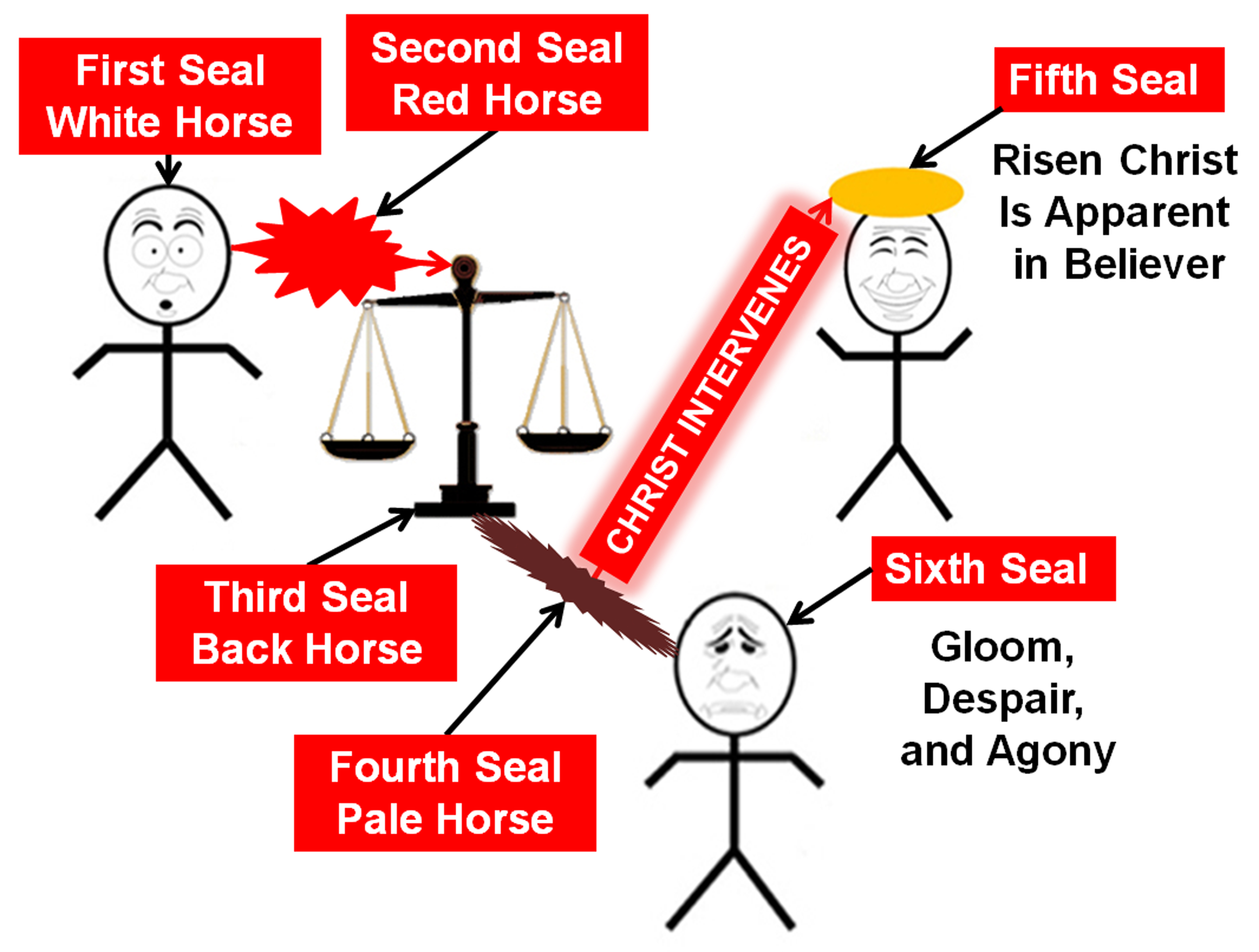How then should we live especially when it is of God that all things are of him, and through him, and to him.

In one of the most challenging statements concerning God for the mind of man to conceive, the greatest spokesperson for Christianity other than Jesus Christ asserted “For of him, and through him, and to him, are all things: to whom be glory for ever” (Rom. 11:36). John, in Revelation, recorded the same profound truth. In describing the worship of God by the twenty-four elders in the heavenly realm, he recorded, “Thou art worthy, O Lord, to receive glory and honour and power: for thou hast created all things, and for thy pleasure they are and were created” (Rev. 4:11). With the English word pleasure being translated from the meaning of the original, “a determination (properly the thing), that is, (actively) choice (specifically purpose, decree; abstractly volition) or (passively) inclination,” the twenty-four elders are ascribing to God the same attribute as Paul: God not only created all things but he also determines all things in creation. If this is true, how then should we live?
How then should we live, if all things are truly of God.
This profound truth that all things are of God can perhaps be understood a little more clear if the context of Paul’s proclamation is examined. He introduced his statement, “For of him, and through him, and to him are all things” with “O the depth of the riches both of the wisdom and knowledge of God!” He would add “how unsearchable are his judgments [original, decisions], and his ways past finding out!” It seems to be a simple statement that the determinations of God, his decisions in the affairs of creation, are unsearchable (original, “not searched out, that is, (by implication) inscrutable”). Again, the question must be raised, if his decision are unsearchable, how then should we live?
In addition, by the unaided or uninspired mind of man, those decisions, his ways (original, “a progress (the route, act or distance”), are pass finding out (original, “not tracked out, that is, (by implication) untraceable”). How many times have we heard ourselves say, “How could God let this happen.” Since God determines all things, obviously, with the raising of that question we are not understanding the “depth of the riches both of the wisdom and knowledge of God.” With the question, it also reveals that ultimately we do not know how then should we live.
In Paul leading up to his statement, “For of him, and through him, and to him are all things,” he further explained why the decisions of God for man are unsearchable and why his ways are pass finding out. He simply raised three questions: “For who hath known the mind of the Lord? or who hath been his counsellor? Or who hath first given to him, and it shall be recompensed unto him again” (Rom. 11:34-25). Obviously, the finite mind of man will always have trouble in trying to achieve knowledge of the infinite mind of God. Secondly, the ultimate knowledge of God needs no consolation from anyone who is actually lacking in knowledge. Finally, the thing created never manipulates the actions of the creator. Thus,
O the depth of the riches both of the wisdom and knowledge of God! how unsearchable are his judgments, and his ways past finding out! For who hath known the mind of the Lord? or who hath been his counsellor? Or who hath first given to him, and it shall be recompensed unto him again? For of him, and through him, and to him, are all things: to whom be glory for ever. Amen (Rom. 11:33-36).
Again, if all things are of him, through him, and to him, how then should we live, especially when the freedom to not only think but to think about our thinking has been given to us. Fortunately, Paul gave the answer but unfortunately many miss the answer mainly because a chapter heading has been inserted into the reading. After Paul make his rather startling statement to the mind of man, “For of him, and through him, and to him are all things,” he wrote, “I beseech you therefore, brethren, by the mercies of God, that ye present your bodies a living sacrifice, holy, acceptable unto God, which is your reasonable service” (Rom. 12:1).
In the Revelation story, as the four horsemen of the apocalypses gallop throughout the land reaping mayhem in the interactions with people, the true believer will “present [his] body a living sacrifice.” By not being conformed to the actions of the four horsemen but rather by having his mind renewed by the Holy Spirit (Rom. 12:2), the results produced in the believer’s life prove the wisdom and knowledge of God. With all things being of him, and through him, and to him, “the good, and acceptable, and perfect will of God” (Rom. 12:2) will always be produced in those who yield their lives to be a living sacrifice.

This is the great truth revealed when the fifth seal in Revelation is removed from the book of life. John recorded, “And when he had opened the fifth seal, I saw under the altar the souls of them that were slain for the word of God, and for the testimony which they held” (Rev. 6:9). Since it has been decreed by God that “Except a corn of wheat fall into the ground and die, it abideth alone: but if it die, it bringeth forth much fruit” (John 12:24) and the New Testament writers wrote that all men would face troubling times (John 15:20; 2 Cor. 4:8-11; 1 Peter 5:9-10), every believer that experiences the glory of the risen Christ will do so only “under the altar” of many living sacrifices. To begin to understand how then should we live is to understand that a living sacrifice is less a volitional act of your will than it is passively not resisting (“by the mercies of God”) what God is doing in the all things that are of him, and through him, and to him.
The believer, as with Jesus in the Garden of Gethsemane (Matt. 26:38-39), will often find his soul troubled on the altar of sacrifice. However, as with Jesus also (Luke 22:43), the true believer will be strengthen from heaven in this earthly experience of sacrifice. John recorded the souls under the altar crying “with a loud voice, saying, How long, O Lord, holy and true, dost thou not judge and avenge our blood on them that dwell on the earth” (Rev. 6:10)? In response, John wrote, “. . . white robes were given unto every one of them.” It was also said, “they should rest yet for a little season, until their fellowservants also and their brethren, that should be killed as they were, should be fulfilled” (Rev. 6:9-11). The four horsemen of the apocalypses were at work plundering, maiming, and destroying, but God was also at work redeeming those who had come to trust in him.
How then should we live is grounded in experiencing the kingdom of God.
Unfortunately, many in the visible church today live far beneath the privileges of being a saint in the kingdom of God. They miss the blessing of the spiritual realm being so in control that the physical realm of their experiences in life loses its power over them. People so controlled by the spiritual realm, natural hunger, thirst, and physical environment lose their relevance in experiencing life (Rev. 7:15-17). Being kingdom saints, the true believers are now under the dominance of the Lamb which is in the midst of the throne of God. The Lamb, as John recorded, “shall feed them, and shall lead them unto living fountains of waters: and God shall wipe away all tears from their eyes (Rev. 7″15-17).
This is the reason and purpose of why Revelation was written: regardless of what the believers in the seven churches of Asia were experiencing, regardless of what the believers in the generation between the resurrection of Jesus and the destruction of the physical nation of Israel would face, and regardless of what all believers in every generation, in every age, and in every century would encounter, hope for all is given.
This is the story of the mysterious seals in the vision of John concerning the “Revelation of Jesus Christ, which God gave unto him, to shew unto his servants things which must shortly come to pass” (Rev. 1:1).

The seventh seal on the book of life is now ready to be opened to reveal its place in the ultimate apocalyptic event of the coming of Christ to establish the kingdom of God on earth.
The story has been told. The proclamation is certain. The consummation of all the ages has come. The kingdom of God in all its power and its glory is available for everyone (yes, even you) in the midst of the current great tribulation.






